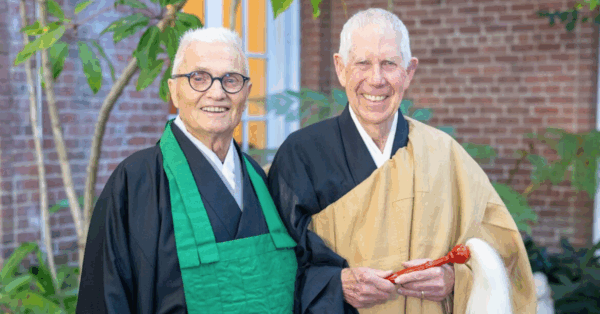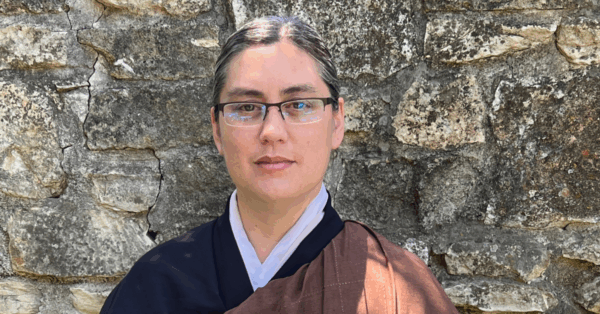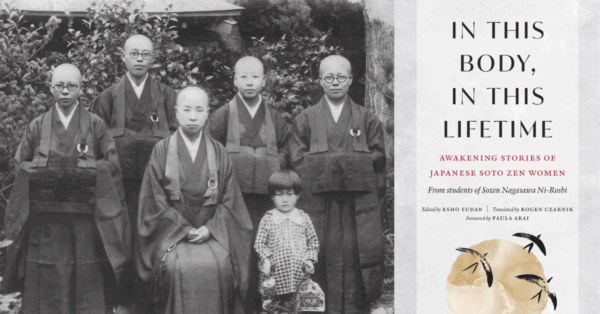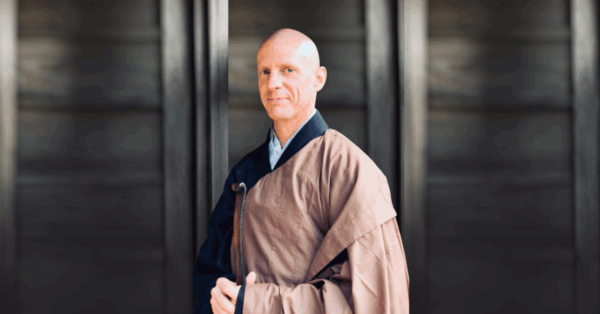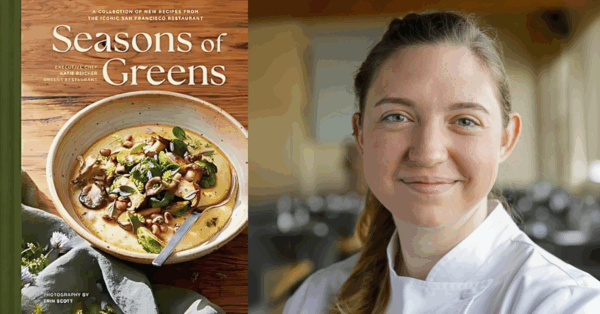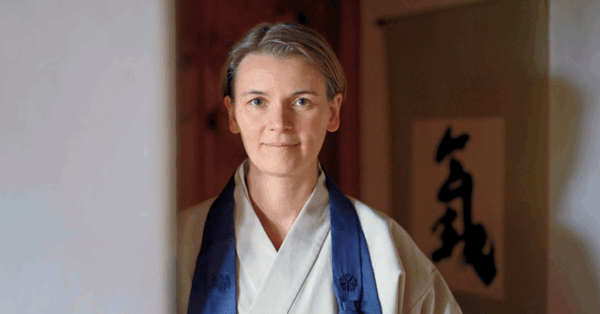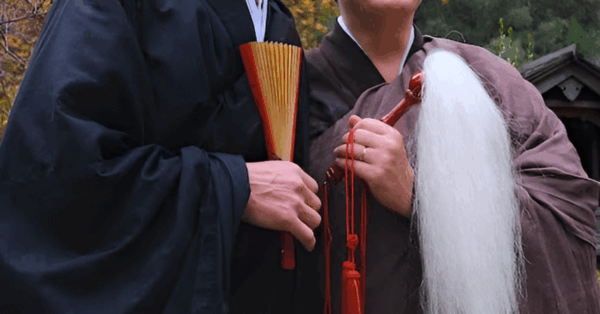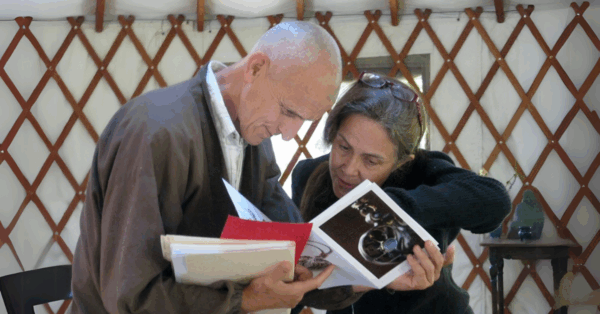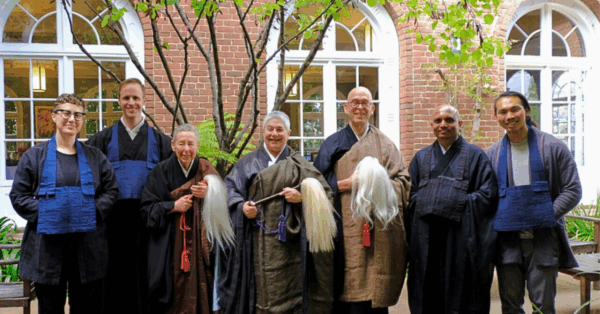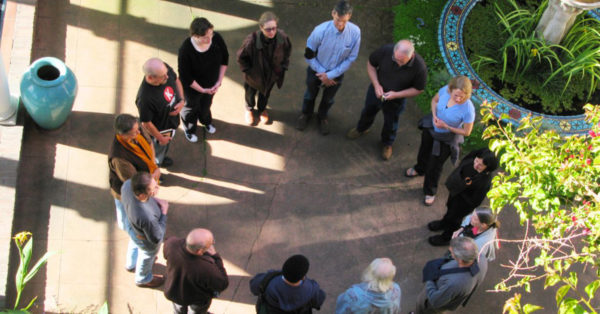
Saturday Sangha bowing in together. Photo by Shundo David Haye.
By Tova Green with Catherine Spaeth
Saturday Sangha, a practice group at City Center, was established over twenty years ago by Teah Strozer when she was tanto/head of practice there. Historically, Saturday Sangha has been a group of volunteers that helps care for the Saturday morning public program at City Center. Participants have received training in a variety of zendo jobs and sometimes have helped in the kitchen. After the Saturday Dharma talk, the group would meet for discussion. Recently, City Center resident priest Catherine Spaeth proposed expanding Saturday Sangha into a wider vision and purpose, integrating temple and community practice in a way that mutually supports, deepens, and benefits both.
Before Anna Thorn, City Center’s most recent tanto/head of practice, returned to Germany this year, she invited Catherine to lead the weekly Saturday Sangha group. The group had met online during the pandemic and long-time members had been returning to in-person attendance. In a discussion with Anna, Catherine had mentioned that, “because City Center has a residential population it is sometimes hard to integrate people from the local community into temple practice.”
The temple’s closing during the pandemic was particularly difficult. Many Saturday Sangha members have had a relationship to City Center that surpasses most residents in number of years of practice and, upon returning, a group of long-time practitioners have re-dedicated themselves. Supporting these leaders of the community to rebuild our sangha is of great importance.
Catherine established her practice at Empty Hand Zen Center in a suburb of New York City. There, “the local urban community was the Zen Center.” She became a resident priest, ordained by the founding teacher of Empty Hand, Jion Susan Postal, who was a Dharma heir of Darlene Cohen. Jion and Catherine ran the center together. “Jion became quite ill and, with her guidance, I kept the temple open. The community became very strong in supporting her by maintaining the practice in all its forms, and there was buoyancy in coming together as a sangha.”
It was a powerful experience for Catherine, as the sangha was fully engaged in supporting each other’s practice. “In my experience, a Zen Center isn’t a Zen Center without [the wider community].”
After practicing for several years at Tassajara, Catherine moved to City Center during shelter-in-place. As the temple began to reopen, she felt inspired to reinvigorate Saturday Sangha. She says she would like there to be growth in the way people are offered opportunities to practice at the temple that supports their daily life. “In Zen Centers all across the world this is expressed through Zen’s traditional forms, with community zazen as a foundation, service, soji (temple cleaning), work practice, kitchen practice and sharing food, Dharma talks, and study, held together within a schedule.”
Catherine would like to encourage community members to join together and enjoy all those aspects of practice. Joining a group that has a schedule—even if it’s only evening meditation and service—can lead to “a juiciness in the feeling of sangha that comes from the experience of moving together. Simply coming for a Dharma talk doesn’t produce that feeling in quite the same way, and without guidance no one would know it is possible.”
Catherine continues: “On this I can say two things. In the kitchen as one is drying the pots and pans and putting them away with great care, there can be a magical moment of connection to the generations of those before, and an experience of gratitude that extends deeply through time. The other is that moving from learning to sound the han, to ringing the bell, learning the zendo instruments one by one and grappling with mistakes, there comes a moment of great beauty. It is as though where there had only been one line in the polygon, and then another, the polygon becomes the honeycomb. When that happens, sangha enters your heart.”
“Saturday Sangha would not just be for Saturdays going forward. Joining everyone makes it possible to provide doan ryo training (the traditional signaling of the han and bells for zazen and ceremonies) and other supportive events targeted for the needs and interests of entering practice in this way.”
The descriptive language will also change: “[Saturday Sangha] is not simply for lay people; its value and function is far beyond that of volunteers, and it is a practice group, not an affinity group, reflecting the diversity of our community coming together in practice. Holding both of these things in mind—both the extension into the week and language that better reflects the functioning of sangha—what was once Saturday Sangha will be renamed ‘Urban Gate Sangha.’”
In support of the enjoyment of zazen, work practice, study, and ceremonial forms, Catherine will co-lead two Sangha Weeks at Tassajara this August. Anyone from the local Bay Area who wishes to enter into the temple practice of City Center is invited to join! To register for one of the Urban Gate Sangha Weeks at Tassajara, click on one of the links below and select the cabin you would like to stay in:
August 8 – 13 with Anshi Zachary Smith and Catherine Spaeth
August 22 – 27 with Shosan Victoria Austin and Catherine Spaeth
If you have any questions or would like more information about Urban Gate Sangha, please contact Catherine at catherine.spaeth@sfzc.org.


